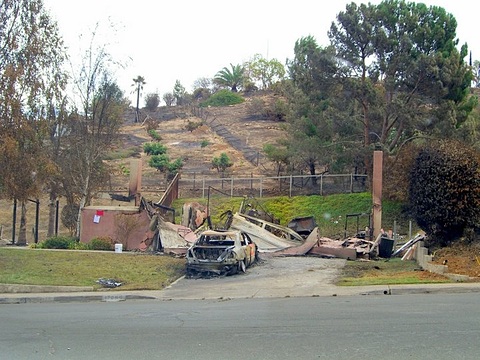Here's your ticket, pack your bag;
time for jumpin' overboard
Transportation is here
Close enough but not too far,
maybe you know where you are
Fightin' fire with fire
Hold tight; wait 'til the party's over
Hold tight; we're in for nasty weather
There has got to be a way
Burning down the house
All wet, yeah, you might need a raincoat
Shakedown thieves walking in broad daylight
Three hundred sixty five degrees
Burning down the house
No visible means of support
and you have not seen nothing yet
Everything's stuck together
I don't know what you expect
staring into the TV set
Fighting fire with fire
Burning down the house
by David Byrne
Ilargi on 18 Sept 2008 in theautomaticearth.blogspot.com
Funny to see Wall Street rise this morning on the central banks’ quarter trillion dollar capital injection.
Predictably, it didn’t even last till noon. Both Morgan Stanley and Goldman Sachs, the Wall Street kingmaker, are now under heavy artillery fire. Or perhaps Troy is a more fitting metaphor.
Funny, because the injection can’t save anything at all; instead, it’s nothing but a sign of despair. When I read about it last night, my first reaction was: 'Way to go, that worked miracles last time around'.
Trillions of dollars have been pumped into the global financial system over the past year, and it hasn’t helped one infinitesimal iota of an inch. That is because the problem is solvency, not liquidity. The world is drowning in liquidity, thanks to Alan Greenspan and his mob-men at the Bank of Japan. It’s just not where the banks would like it; it’s not in their pockets.
The people who do have it refuse to lend it to the banks any longer, because they’ve burned through it like a house on fire. Moreover, all the money central banks have intravenously injected has disappeared into that same burning house. The banks either use it to pay off their endless arrays of debts, or they hoard it for times when paying off the rest of those debts can no longer be postponed.
The alleged idea is to make banks lend to each other, and to potential home-buyers, but that is not happening. It didn’t in earlier money pumping actions, and it won’t this time. Banks still don’t trust each other, and for very good reasons. Bank A refuses to lend to Bank B, because it is afraid that Bank B holds the exact same soiled casino toilet paper in its vaults that Bank A itself has. And no amount of temporary central-bank-furnished borrowed
credit can make that toilet paper magically become clean or valuable again, or make it disappear from the vaults.
These banks are insolvent, they are bankrupt. Sooner or later they will go the way of the pterodactyl, unable to pay back the credit they now receive, for which the central banks accept ever more worthless toilet paper as collateral. Sooner or later the FEd and the ECB will be the proud owners of the vast majority of the world’s dirty stinking Kleenex.
And then the central bank will turn to the Treasury, and the Treasury will fork over. You know what the Treasury will give them? Your money, that’s what. So you will be paying through the nose for paper that your central banks and Treasuries have acquired from banks, knowing full well that it wasn’t worth even a fraction of what they're giving the banks in exchange. But they will keep insisting that the markets will rise again, and the paper will regain its
value. And the citizens of the countries they reside in, the very people who are duped and cheated out of their money wherever they look, will keep on believing them.
Meanwhile, all this is a plain and simple truth for everyone in the know inside the financial system. Repeating again and again what has so obviously not worked in the past is the ultimate sign of weakness. Not that they don’t appreciate all the added free lunches. It’ll all be metabolized into the black hole, in a few days at the most (more likely a few hours) and then the insatiable sharks will go back to chasing the trail of blood in the water.
Credit injections do not help, because they cannot. Painkillers do not cure cancer. In the public eye, what passes for medical staff in the financial world in the US and EU, in the face of being found out to be a bunch of frauds and quacks, try to keep up the appearance of being in control. Meanwhile, behind the public's back, their friends in the know prepare to make another killing off the public purse. And it takes ever increasing amounts of your money to keep up the
charade for ever shorter amounts of time.
This whole thing is not getting better, it’s getting worse. And fast. I have already mentioned the law-bending and breaking by Bernanke and Paulson that has taken place in the US recently, the stocks for T-Bills at the Fed windows, and BoA using its customer deposits for blackjack Merrill 'investment banking'.
It’s not just the US: UK prime minister Gordon Brown, in facilitating the HBOS takeover by Lloyd’s, is changing British banking laws on the fly, as if they are his to do with as he pleases. You know what’s really funny? Neither Bernanke nor Paulson nor Brown were elected to their posts.
The laws involved are competition related: the new UK super bank holds one third of all deposits and mortgages in the UK. Where I come from, that’s called a cartel. It’s now legal, or passes for it, in Britain.
All of this, the trillions in taxpayer money hand-outs as well as the law breaking, is presented as necessary to 'save the system'. But that’s a fraudulent claim: the system cannot be saved, the system is bankrupt, as are the banks and the US government.
What the actions achieve is a few days or weeks of additional time to fleece the taxpayers out of an additonal part of the already sorrowfully meagre remnants of what was once rightfully seen as their wealth. And those same taxpayers are not going to clue in before they’ve lost it all: the entire criminal enterprise is presented as protection of the taxpayers, and they all swallow it hook, line and stinker.
The system is way beyond salvation, and has been for years. The sleight-of-hand 'efforts to save the sytem' cannot succeed. And it is in no way in the interest of the taxpayer to try to save the system. It’s in the interest of the people that run it, the ones that have one hand on the triggers of the central banks, and one hand in your pockets.
The Martians
Have Landed

image above:Naked" Shorts 1919" - Washington, D.C. Chorus girls at Sidney Lust's Leader Theater
Ilargi on 18 Sept 2008 in theautomaticearth.blogspot.com (later)
The world becomes a crazier place by the minute these days. Hot darn, I figured I could get some down time tonight, with the Dow up 3.86%. You think? Damn you, Hiwwawy Cwinton!!
The nuttiest plan in centuries comes out of the SEC this evening, and while it remains to be seen whether it’ll be given a chance at survival, it’s so far out there, out of anywhere including the left field recently discovered in Andromeda X, that I need to write this.
There’s a strong competitor for most stupid idea of the millenium in the plan for a repository for "all the bad debt" on Wall Street. I’ll address that tomorow. But jeez, what is this, a competition for the most gloriously braindead award?
The SEC wants a ban on all short selling of stocks. Which means that the stock market as it functions now is dead, gone, over, and pining for the fjords.
Mind you, the reason is glaringly obvious: every single financial institution on the bleeping planet is being shorted these days. And no, you’re right, they don’t like that. Well, unless they can short the neighbour while they themselves survive.
Why are they being shorted? Because they are dying of a terminal affliction. And that means there’s money to be made in betting against them. Just like there’s risk-bearing money in buying stocks you think will do well, but the 180 degree opposite. Two sides of the same coin. In fact, can you still sell any stock that you are losing money on if the SEC gets its way?
So what do you do when someone’s dying, and you don’t want anyone to know? You close the doors. Check. Prop up the corpse. Check. Photoshop. Check.
If this Martian idea gains favour, stocks will go through the roof of the roof of the roof. For a few days. Everyone who’s short out there, and there’s zillions of them, will have to cover, and still lose their shorts and shirts and socks and pants.
And when that is done, stocks will seek and find bottoms and gutters that you never even imagined existed. Nobody will buy anything anymore. And then they will come up with a way to make you pay for it all. Nah, they wouldn’t do that, would they?
It’s like fielding a foorball team, but being forced to play without the defense.
Even that is possible right now. Know why? The party under attack is Goldman Sachs. That's why.
SEC Plans to Temporarily Ban Short-Selling
The Securities and Exchange Commission took its most aggressive assault against bearish stock bets by stating its intention to issue a temporary ban on short-selling.
SEC Chairman Christopher Cox briefed Congress late Thursday of the agency's intention to take the extraordinary step of interfering with the market's regular functioning. Short-selling is a trading strategy of selling borrowed stock in hopes it falls and can be repurchased at a lower price.
It's unclear if the SEC's intention has been approved by the commissioners, which is required, and whether which stocks are covered or for how long it will be in effect. Earlier this summer, the SEC moved to restrict certain short-selling practices for 29 days, covering 19 financial stocks.
Thursday, the U.K.'s Financial Services Authority said it would ban short selling in financial stocks until January. The FSA said it would review the effect of the ban each month. The FSA also announced additional disclosure requirements from hedge funds of short-sales if a certain threshold is met.
The SEC's decision comes amid increasing concern that short-sellers are abusing legal trading strategies to drive financial stocks lower. Since the near-collapse of Bear Stearns & Cos. in March, regulators have been looking into a combination of short-sales and false rumors are part of the problem.
U.K. Treasury Chief Alistair Darling, who was involved in the FSA's decision, said in a statement Thursday, he welcomed the FSA's "decisive action." He said in current market conditions it was in the "interests of financial stability."
In a short sale, a trader sells borrowed stock, hoping it will fall in price and can be repurchased later at a profit. The pressure to step up efforts against short-selling gathered steam since last weekend when Lehman Brothers Holdings Inc. steered toward bankruptcy and Merrill Lynch & Co looked for a buyer. Wall Street executives urged Mr. Cox to take steps to slow the sell-off, which they believe is triggered by heavy short selling.
Investment banks are particularly vulnerable to low stock prices as it hurts their ability to raise capital to secure their funding.
The SEC sped up its rule-making and on Wednesday the SEC announced three trading rules that were aimed at curbing abusive short selling. That was followed late Wednesday night with intentions to require hedge funds to disclose more information about their short positions.
SEC Reportedly Plans Temporary Ban On Short Selling
Wow. In a move with huge ramifications for the stock market - and which is likely to result in howls of protest from hedge funds, arbs and various other market players, the SEC is planning a temporary ban on short-selling, according to the Wall Street Journal.
The story says it is unclear whether the move, which SEC Chairman Chis Cox reportedly described to Congress late Thursday, has been approved by the SEC’s commissioners, which would be required. It’s also unclear which stocks would be covered, or how long the ban would be in effect.
The WSJ piece raises more questions than it answers. What about short positions used to hedge convertible bond positions, or hedge funds used by risk arbitrageurs to establish positions in companies that are being acquired? What happens to short positioned already held? What would be the impact of this move on market makers, who sometimes short shares to keep markets orderly, or to the options market?
As I said, more questions than answers. But it certainly should make tomorrow interesting.
SEC weighs ban on short selling
US securities regulators were on Thursday night considering a ban on short selling as part of a group of new initiatives to restore calm to the stricken financial markets, people familiar with the situation said.
The US Securities and Exchange Commission was discussing a short-selling ban on some or all stocks and an announcement could come as early as Friday, these people said.
The SEC, which had already announced several actions to curb abusive short-selling on Wednesday, came under growing pressure to take more dramatic steps. Earlier on Thursday, short-selling in the UK was banned by the Financial Services Authority.
Christopher Cox, the chairman of the SEC, attended a meeting with US lawmakers, the head of the US Federal Reserve and the Treasury Secretary on Thursday night to discuss various solutions to the financial crisis.
Short-sellers, who profit from falling prices, particularly hedge funds, have been blamed for plunging shares of financial firms.
Shares in Morgan Stanley and Goldman Sachs – the two last independent banks on Wall Street – have fallen precipitously in the past week.
Many blame short-sellers for pushing down the share price of Lehman Brothers, which filed for bankruptcy, and of AIG, the insurance giant that was rescued by the government this week.
While the move is likely to be welcomed by many firms who claim they are the target of short-sellers, hedge funds have already warned that bans make it impossible to hedge investment risk during a rights issue or placing. The rule would also push up the cost to banks of raising new capital and share could also become more expensive to trade, as hedge funds provide less liquidity to the market.
|


